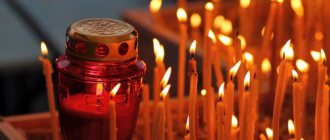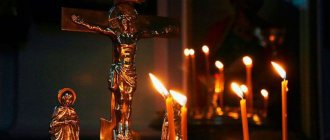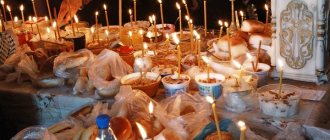Most people are convinced that life does not end after death. If the body dies, then the soul remains to live forever.
After death, a person's soul appears before God. If he sinned a lot during his earthly life, such a meeting is difficult. For those who lived according to all the commandments of the Lord, the meeting will bring joy. During the first 9 days after death, Heaven decides what will happen to the soul, so during these days relatives should pray for the deceased. From this article you will find out whether it is possible to go to a cemetery for 9 days, and what relatives should do.
How can you help the soul of the deceased?
Close and dear people can help the soul of a loved one, starting from the day the soul departs. The funeral service for the deceased takes place in the church and a sorokoust is ordered - a commemoration of the deceased, which is heard at every liturgy. If there is no daily service in the parish church, then the magpie must be ordered in a monastery or any church with daily liturgy. This remembrance continues until the fortieth day, on which a special prayer rite must be served - a requiem. During these forty days, in addition to church prayer, home (cell) prayer is obligatory for relatives. The Psalter is read for the deceased, special prayer chants for the deceased, there are special texts of rules about deceased relatives, spouses, and children. You can read the canon “On the One Who Died.” Great help can be provided to the soul if several people begin to simultaneously pray for the deceased, especially if they mark this prayer with action - they need fasting, giving up bad habits, and entertainment.
What is on the table
The funeral dinner must certainly include traditional kutia - boiled wheat grains with sugar or honey, which must be consecrated in the temple. If this cannot be done, the kutya is sprinkled with holy baptismal water three times.
Since different regions have their own customs, sometimes they prepare rice or corn porridge, garnishing it with raisins; in some places these are pieces of white bread soaked in honey water.
The most common set of dishes is:
Funeral table: borscht; thin pancakes with poppy seeds, cottage cheese, sometimes liver; canapés with sprats; fish appetizers; vinaigrette salads; cutlets or cabbage rolls; boiled potatoes; pies (most often with poppy seeds or apples); drinks: jelly, compote or kvass.
Cookies and sweets are also on display, with which those present came to the funeral.
In general, it is appropriate and even customary to prepare the favorite dishes of the newly deceased. This is also a kind of peculiar kind of memory of him.
It may happen that 9 days fall during the fasting period. Then the entire meat menu should be replaced with fish, and the same cabbage rolls should be prepared with vegetables, with mushrooms instead of meat.
Alcohol can cause behavior inappropriate for the occasion, therefore its presence on the table is categorically not welcomed by the church. We must remember that drunkenness is a great sin, but at funerals, people, on the contrary, pray for forgiveness of all sins.
The question often arises of what should be carried by those going to the 9-day remembrance. Flowers are brought to the grave, and red wine, sweets, and cookies are appropriate for the table. It is acceptable to remember the deceased with three traditional glasses of red wine.
At the table
The meal must begin with prayer. The funeral meal begins with the prayer “Our Father” and ends with it. After this, everyone present puts a couple of spoons of kutya on their plate and eats it before the meal begins.
Those gathered remember the person who has passed away quietly and kindly. There is no need to talk about unseemly actions or not the most pleasant character traits of the deceased.
We are all not angels, just as the deceased was not an angel, and the church does not recommend focusing attention on this, so as not to harm his soul during this crucial period for it.
As mentioned, prayers are read during the meal, therefore the ladies’ heads should be covered with handkerchiefs or scarves, and not necessarily black ones. Only those close to the deceased can have such as a sign of deep mourning. Men, on the contrary, stand in prayer with their heads uncovered.
You should not linger at the table for a long time, so as not to turn the funeral dinner into a banal feast.
It is possible that more dishes were prepared than people came. Then everything that remains should be distributed to those who are poorer, or simply to the poor, asking them to remember the deceased.
Commemoration on the 9th day after departure into another world helps the soul of the deceased to appear before the throne of God with understandable fear and trembling. Accompanied by her guardian angel, she has already become acquainted with heaven, and after a conversation with the Almighty she will go on a further journey - to hell. Her fate has not yet been finally determined, and therefore it is within the power of her friends and relatives to support her with prayers and memories of the good deeds done by the deceased and help her rest in the Kingdom of Heaven.
What happens after the soul departs
According to Orthodox canons, 3, 9 and 40 days after death are important for the deceased. After dormition (falling asleep), as death is called in Orthodoxy, the human soul spends three days next to its body, the people to whom it was attached during life, and beloved and memorable places. She realizes what happened, comes to terms with her situation, and prepares to leave forever. Baptized Christians are accompanied by their guardian angel, who helps them come to terms with the idea of the end of earthly life. The soul experiences heaviness and sorrow from parting with its familiar body and loved ones, especially when the soul departed suddenly, due to an accident or by force.
How to properly set a funeral table
The Church does not recommend placing alcoholic drinks on the funeral table, which could cause inappropriate behavior. Drunkenness is a great sin, and during the funeral dinner, participants ask for forgiveness of the deceased’s sins.
The main dish on the funeral table is kutia. Depending on the region, it is prepared from millet, rice, corn or wheat with the addition of honey. This dish is eaten first. Then the liquid is served. It could be borscht or homemade noodles with chicken. For the second course, prepare porridge or mashed potatoes, which is served with fried chicken, cutlet or fish. Cold appetizers can be prepared at your discretion. At the end of the meal, people are given sweet pies or pancakes stuffed with cottage cheese or poppy seeds.
Funeral dinner
The funeral dinner serves as the final part of the farewell of relatives and friends to the deceased. It happens after returning from a funeral and takes place at home or in public eating places. The funeral meal begins and ends with prayer.
In Orthodoxy, Wednesday and Friday of each week (except for continuous weeks) are considered fast, when it is not allowed to serve dishes containing meat, eggs, cheese, dairy products and butter. In addition to ordinary weeks, there are Orthodox fasts - non-strict and strict, special fasting days on the eve of holidays. Relatives preparing a funeral dinner or placing an order will need to find out in the church or in the Orthodox calendar what the 3rd, 9th or 40th day after death means, what fast or Orthodox holiday it falls on, in order to properly set the funeral table. According to the rules for Orthodox Christians, alcoholic drinks at funerals are strictly prohibited. A luxurious feast on this day is inappropriate.
At dinner, you can make a short speech about the deceased, remember him with a kind word. A wake should be help and support for the soul of a deceased person on its difficult path to God, and not become a reason for a feast. All remaining food must be distributed to those participating. Often, sweets and cookies are brought to a relative in advance to be distributed after the meal with a request for prayer for the deceased.
Nine days after death - meaning for the deceased
Souls contain everything that is in heaven. (Balmont K.D.)
The meaning of tithing after death is important for the soul of the deceased. At this time, the spirit is busy searching for a path to follow. Some believe in the rebirth of the soul after death. Judging by the literature on reincarnation, from the third day to the fortieth day the soul is busy reviewing and analyzing life’s mistakes. There is a theory that the soul itself makes a decision about what its subsequent incarnation will be.
If we are guided by Christian sources, the righteous are destined for Paradise, and sinners are destined for torment in Hell. The soul of the deceased on the ninth day is still busy searching for a continuation of the path. At this time, the relatives of the deceased should try to release him. It is impossible to completely forget about pain and suffering - any loss is saturated with these feelings. But calming the souls of the living will bring meaning to the deceased: it is better to bring benefit through prayers, not tears. The person will find peace, stop worrying about the living and go where he belongs.
In the Orthodox tradition, it is believed that from the fourth to the ninth days the soul is shown Heaven, and then, from the ninth to the fortieth days, Hell. On nine days, the deceased completely forgets about all the sorrow that he felt during earthly life, and does not remember physical pain. Sinful souls at this time begin to experience true repentance. The prayers of family and friends are important at this moment - the deceased will need the support of relatives.
At this time, the spirit appears before God for the first time. It is customary to order prayer services, arrange funeral services, read prayers, and help the deceased pass afterlife tests in other ways. During church services, you should ask for your soul to join the ranks of the angels. A relative can become a personal guardian angel. Pagans believe that deceased ancestors are nearby and ready to help.
How to behave at a cemetery and funeral
The death of a loved one or just an acquaintance always means a sad event. Funerals that occur after death on the 3rd, 9th and 40th day are accompanied by sadness from parting with the deceased. It is customary to wear clothes in dark tones or modest, discreet colors to a funeral or memorial. Bright colors, abundant cosmetics and jewelry look inappropriate on this day. Women are required to wear a dress or skirt below the knees; even on the hottest days, it is customary to cover their shoulders. The head and décolleté area should be covered with a dark scarf or scarf. Men should wear trousers, not a bright shirt that covers their shoulders. In church or when saying goodbye to the deceased in a cemetery, it is customary to take off your headdress, even in extreme cold, with exceptions only for very young children. When saying goodbye, you can say a few kind words and make a short speech.
Rules for holding a wake 9 days
Commemoration must comply with the rules. In the morning they visit church, light a candle for the repose and order a memorial service.
What they bring to the church for the 9-day funeral:
- Be sure to kutya boiled wheat with honey, after the blessing of the priest it is taken away for the funeral dinner;
- red wine;
- vegetable oil;
- eggs;
- sweets;
- cookie;
- candies;
- pies.
They visit the burial place of the deceased, remove dried flowers and wreaths. They say good words about the deceased, ask for forgiveness and pray. Such actions ease the ordeal of the spirit of a deceased person. You can invite a priest, he will conduct a litany. According to Orthodox rules, it is forbidden to commemorate people in a cemetery, they also do not leave vodka, do not pour it on the grave, they only distribute sweets and treats.
Funeral dinner
A memorial dinner is held at home or in a cafe, and relatives and friends of the deceased are invited to honor his memory. The first is prepared, it can be borscht, chicken and noodle soup, the second is cabbage rolls, fish or cutlets, with potatoes as a side dish, fruit or dried fruit compote, and baked pies. A modest dinner is not a demonstration of poverty, but an indicator of the frailty of the body before the spirit. Kutya and fresh flowers in a vase must be placed on the table. It is not customary to include snacks, salads, or alcohol, but vodka, cognac, and Cahors are recommended to relieve mental stress. If there are any food left after the funeral dinner, they are distributed.
Also read: First Confession and Communion, how to prepare
If they are commemorated at home, then the room is prepared. They put a photo of the deceased person in a visible place in a black frame and with a ribbon, a glass of water and a piece of bread, light a lamp, and place a vase for money next to it. Perhaps people who come will want to make a donation. The mirrors are no longer covered. It is not customary on this day to engage in entertainment, listen to loud music, or watch entertainment programs on TV.
No special invitation is required for the wake. The logic is simple: the more people remember, the better. Family members and relatives take part in the funeral dinner. People who washed the body, dug the grave, and made the coffin are also invited.
But few people host a funeral dinner. Some don't have enough time, others don't have enough money. The church is understanding and does not consider lunch a mandatory rule. This is a matter for each person personally. You can replace the funeral with treats that you can buy or prepare yourself, for example, bake pies or cookies. You can distribute it to grandmothers, children, and employees at work.
Folk rituals
In some areas, there used to be a belief that prepared personal items should be placed in the coffin - a comb, a watch, money, jewelry. They say that the reason is to help the deceased, that it will be easier for the soul in the afterlife to be with its things. The Orthodox Church considers this ritual a relic of paganism and a contradiction to the Christian burial order.
Another well-known folk custom is hanging mirrors in the house of a deceased person. This is not an Orthodox rite; it has no meaning for the soul of the deceased. The Church neither approves nor condemns him, since when covering mirrors, relatives do this so as not to be distracted from prayer. Usually mirrors are covered on the first day, and it is believed that black covers must be removed 9 days after death. In the room of the deceased, the mirror remains curtained until the fortieth day.
What do the relatives of the deceased do?
On the day when the soul appears before the Creator, family and friends must make every effort to help the deceased earn heaven. It is believed that on the 9th day after death, angels intercede for the soul. But the prayers of living people are also of great importance.
Of course, if you treat funeral customs formally, then this will be of little use. The prayer for the salvation of the soul must be sincere, then it acquires true power.
Lord Jesus, accept the soul of your servant (name of the deceased), forgive him all his sins, small and large, and accept him into heaven. How he suffered in his life, how tired he was of suffering and sorrow on this earth, so now let him rest in peace and sleep eternal sleep. Protect him from the fire of hell, do not allow him to fall to the demons and to the devil to be torn to pieces. In the name of the Father, and the Son and the Holy Spirit. Amen.
Funerals for the unbaptized and suicides
All church commemorations are performed for people who were baptized in the Orthodox Church. Unbaptized adults or those who committed suicide deliberately refused the patronage of the church, so they are not prayed for in churches. They are not commemorated at the liturgy; funeral services cannot be held in churches.
There are exceptions to this rule:
Baptized suicides who are registered in mental health centers always have a funeral service in church, there is church prayer for them, only the relatives need to bring a certificate about the mental state of the deceased. Unbaptized infants do not have a funeral service, and there is no personal prayer for them, but the Orthodox Church prays for dead infants (in the church children under seven years of age are considered infants) at all prescribed general funeral services; Unbaptized soldiers, those liable for military service, who died as a result of hostilities or in peacetime during active service, do not have funeral services in churches, but there is also a general church prayer for them (without naming names) at memorial services on parental Saturdays. For all the dead, no matter what church they belonged to or considered themselves atheists, whether they were baptized or not, you can order and hold a funeral service and read home prayers.
For people who were not buried according to church rites, we need to read more home prayers to the martyr Uar, the Mother of God, pray in our own words, give remembrance to those in need. Some priests advise finding and providing all possible permanent assistance to poor elderly people, donating to nursing homes, large families, in memory of the deceased.
Behavior in church
For Orthodox relatives, attendance at the funeral service on the occasion of nine days is mandatory.
All people present in the temple light candles for the repose of the deceased according to the following order:
- First, you should go to the icon, near which there are candles for repose, as a rule, these are images of the crucified Jesus, and cross yourself.
- A pre-purchased candle is lit from other burning candles. If there are none, then ignition from a fire from a lamp is allowed. The use of matches or lighters brought with you is prohibited.
- Place a lit candle in an empty space. First, you can melt the bottom edge of the candle a little so that it stands stable.
- To ask God to rest the soul of a deceased person, his full name should be given.
- Cross yourself, bow and quietly move away from the lamp.
For prayer for the repose, the candlesticks located on the left side of the temple are made in a rectangular shape, in contrast to the round tables with candles for health.
The candles placed in the temple symbolize a collective request, a prayer for the newly deceased.
Praying for the repose of the soul of the person who has passed into the afterlife, requests are sent to Heaven for the great mercy of God to the sinful newly departed person. The more people pray for forgiveness, the lower the forgiveness scale falls.
You can ask both God and the angels and saints.
Prayer for the dead on day 9
“God of spirits and all flesh, having trampled down death and abolished the devil, and given life to Thy world! Himself, Lord, give rest to the souls of your departed servants: your most holy patriarchs, your eminence metropolitans, archbishops and bishops, who served you in the priestly, ecclesiastical and monastic ranks;
the creators of this holy temple, the Orthodox forefathers, fathers, brothers and sisters, lying here and everywhere; leaders and warriors who laid down their lives for the faith and fatherland, the faithful, who were killed in internecine warfare, drowned, burned, frozen to death, torn to pieces by beasts, suddenly died without repentance and did not have time to reconcile with the Church and with their enemies; in the frenzy of the mind of those who committed suicide, those for whom we were commanded and asked to pray, for whom there is no one to pray and the faithful, Christian burials deprived of (the name of the rivers) in a bright place, in a green place, in a place of peace, from where sickness, sadness and sighing can escape.
Every sin committed by them in word or deed or thought, as a good Lover of mankind, God forgives, as if there is no man who will live and not sin. For You are the only one besides sin, Your righteousness is truth forever, and Your word is truth. For You are the Resurrection, and the Life and Repose of Your departed servants (the name of the rivers), Christ our God, and to You we send glory with Your beginningless Father, and Your Most Holy, and Good, and Life-giving Spirit, now and ever and unto the ages of ages. Amen".
How to calculate the required period?
People often get confused with this. It is best to contact the Father who performed the funeral service for the deceased. He will help you figure out the deadlines and tell you on what day to celebrate what. Due to its importance to the soul, you need to know exactly when to hold a wake for 9 days. How to count on your own? The first day is the day the person died. It is from this that we must count. From the moment of death, the soul begins its journey through the Kingdom of Angels. She needs help on the ninth day (and before that). Do not miss any deadlines, even if the death occurred before midnight. The first day is the date of death. The third, ninth and fortieth days are then important. You need to calculate them immediately and write them down so as not to forget. These are the dates that definitely need to be celebrated.











